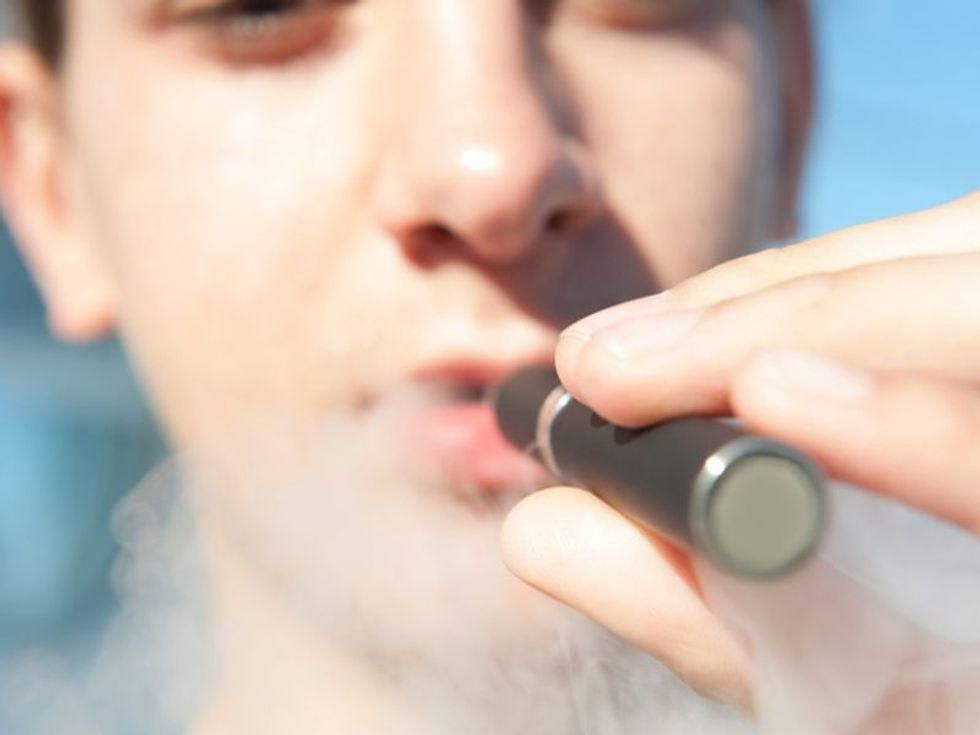
Four out of five U.S. parents questioned in a large poll believe their preteen and teenage kids are clear on the risks that electronic cigarettes pose, and only a few think their child actually vapes.
Still, if their child did vape, would parents know? Nearly half of more than 1,300 parents polled said they would.
The findings, experts say, point to a potential disconnect between what parents think is going on and the real deal when it comes to vaping among American youth.
“These findings point to a few ways parents might be off,” said poll co-director Sarah Clark.
For one thing, Clark pointed to 2022 data compiled by the U.S. Centers for Disease Control and Prevention that found that 14% of high school students and 3% of middle schoolers had vaped in the prior month.
It’s not so easy to tell if your child is among them, cautioned Clark, a research scientist with the Child Health Evaluation and Research Center at the University of Michigan.
She noted, for example, that many parents in her team’s poll “appear to think vaping would leave a detectable odor, the way traditional cigarettes do. This is not the case.”
Many of the parents also believe “they will find vaping devices or supplies,” Clark added. “However, disposable vapes are popular with youth, and likely are thrown away before parents have a chance to find them.” Also, a number of them are disguised as pens, phone cases or watches.
“And many parents think their child would tell them if they were vaping, despite a long history of kids trying to hide this type of thing,” she said.
The vaping poll is the latest release from the C.S. Mott Children’s Hospital National Poll on Children’s Health. Conducted in February, it surveyed parents who have at least one child between 11 and 18 years old.
About 5% of the parents said they themselves are active vapers; another 18% acknowledged vaping in the past.
Among the other findings:
- Roughly 9 in 10 parents said vaping is addictive
- About 8 in 10 said their child knows about the health risks
- 48% think they would definitely know and 40% said they’d probably know if they’re child was vaping.
How would they know? About two-thirds said their kids would tell them, while 57% said they’d come across vaping paraphernalia among their child’s possessions. Nearly half (48%) said they would smell it, and 37% said other people would tell them.
As for consequences for young vapers, parental opinion was “all over the place,” said Clark.
While 7 in 10 said children should be held responsible for their actions, about half said the blame should fall on vape sellers. Some said the parents themselves should be held to account.
About 3 in 10 said their child should be suspended if caught vaping in school and about 2 in 10 said they should be barred from school activities. Others favored a less harsh punishment like detention or a warning. About 5% said there should be no consequence.
If caught vaping by police outside of school, 30% favored mandated community service and 26% favored counseling. A smaller percentage supported a warning or a fine. Nearly 10% said there should be no punishment.
On the subject of prevention, 7 in 10 said better enforcement of retail restrictions would help, while almost 60% favored hiking vape taxes. About half said vape advertising on social media should be limited, and 3 in 10 supported warning labels on vape packaging.
Clark, meanwhile, said more research is needed, noting a “constant stream of new products and delivery systems” presents a moving target.
She added there is “a consensus that there are health risks associated with vaping.” And that consensus suggests parents need to be clear-headed, vigilant and involved when it comes to their child’s choices.
Minal Patel, a senior principal scientist with the American Cancer Society’s tobacco control group, agrees.
She said the relative newness of vaping means it may take decades to appreciate the full extent of its impact on health. But one thing is already clear: “No youth should be using e-cigarettes or any tobacco products,” Patel noted.
“All tobacco use, including e-cigarette use, poses a risk to the health of the user,” she insisted. “This is especially concerning for youth, as their brains are still developing and there is a risk for becoming dependent on nicotine.”
Patel stressed that the onus for combatting vaping among youth should not fall solely on the shoulders of parents. “Policies both at the school level and local level are important to prevent the sale of e-cigarettes to minors,” she said.
But “given that parents underestimate whether their own child is vaping, it is especially important for parents to be vigilant, and discuss the potential harms with their child,” Patel added.
As to how these conversations should unfold, parents “will need to put in some effort to stay current,” Clark said. But parents may be able to use this to their advantage by perhaps highlighting the need to discuss a form of tobacco use that they’re not so familiar with.
Those conversations, advised Clark, could be packaged as a broader back-and-forth as to what kids in general are doing, “so it doesn’t come across as pressuring their child.”
The Mott Poll Report was released March 20.
More information
The U.S. Centers for Disease Control and Prevention has more on vaping risks for young people.
SOURCES: Sarah J. Clark, MPH, research scientist, department of pediatrics, Child Health Evaluation and Research Center, University of Michigan, Ann Arbor; Minal Patel, PhD, MPH, senior principal scientist, tobacco control group, American Cancer Society; Mott Poll Report, March 20, 2023
Source: HealthDay
Copyright © 2024 HealthDay. All rights reserved.

Leave a Reply